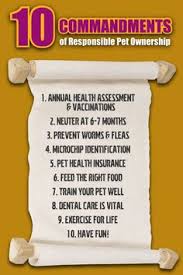Tips
Editorial Board,
13 - Dec - 2015
How to be a good pet owner

- Buying a Pet Spontaneously
- Skipping Obedience Training
- Being Inconsistent With the Rules
- Dispensing Too Many Free Treats
- Neglecting to Socialize Your Pet
- Skimping on Exercise
- Neglecting to Keep Your Pet Mentally Active
- Leaving a Pet Alone for Too Long
- Failing to Make Your Home Pet-Friendly
- Punishing Your Pet
10 Suggestions for How to Be a Mistake-Proof Pet Owner
- Research what type of pet is best suited for your family’s personality and lifestyle. Dogs require more attention, time and energy than cats do, so if you don’t enjoy walks or hikes in the outdoors, or can’t imagine getting up on cold winter mornings to take your pet out to potty, a cat may be more your style.
Breed characteristics differ, so if you’re looking for a lapdog, you should look into a less-active breed. If you or other members of your family are very active outdoors and plan to bring a pet along, a hardier, more active breed is a better fit.
Some pets require daily brushing and grooming, others don’t require nearly as much.
Your chances of having a wonderful relation with a pet increases dramatically when you give serious thought to the type of animal that best suits you, and choose accordingly.
- Train your dog for a lifetime of obedience. Behavior problems are the number one reason dogs are relinquished to animal shelters, the number one reason they don’t find new forever homes, and as a result, the number one reason dogs are euthanized.
From the day you bring your puppy or adult dog home, you should begin teaching her commands such as come, sit, stay, and down. A puppy should begin formal training at eight weeks, and if you adopt an adult dog that has received no obedience training, you should enroll her in a class right away.
It’s also good idea to take your dog through a refresher course every few years, or when you need help with the inevitable behavioral glitch that will pop up as she ages.
- Apply house rules consistently. It’s very important for each member of the family to be on the same page when it comes to what your pet is and isn’t allowed to do in your home.
If one family member lets the dog bark at outside noises, but another family member corrects the behavior, you confuse the dog. If you don’t mind the kitty drinking from the bathroom sink but your husband does, decide which way it’s going to be and stick with it.
When your pet knows what to expect from his behavior, he will be much more inclined to do more of what you approve of and less of what you don’t.
- Limit treats to training rewards. This is an excellent way to make sure your dog views treats as special rather than expected. It’s also helpful in keeping your pat fit
Feed an appropriate diet and partner with a holistic or integrative vet to maintain your pet’s well-being.
- Socialize your pet. This is especially important for puppies. Again – behavior problems are the number one reason dogs don’t stay with their families and don’t get adopted by new families.
Lack of proper socialisation can result in inappropriate fears, aggressive behavior, general timidity, and a host of other behavior problems that are difficult to extinguish once a dog is mature.
The ideal time for socialization is between three and 12 weeks for dogs; between two and eight weeks for cats.
- Help your pet be as active as nature intended. Exercise and play time are necessary for your pet’s mental and physical well-being. If you don’t give your dog enough excercise or if you don’t encourage exercise for your kitty and find ways to make it happen, you may well end up with a bored, destructive, overweight pet whose health will spiral downward throughout her lifetime.
- Find ways to enrich your pet’s environment. Your dog or cat needs your help to stay mentally stimulated. This is important not only to discourage destructive behavior in younger pets, but also to keep your older pets brain sharp.
- Make sure your pet is in good company. Pets get lonely and depressed just like people do when they spend too much time alone. Cats are generally better on their own, but dogs and especially puppies dont do well if left to their own for extended periods of time.
If you’re regularly away from home 10 or 12 hours a day or you travel out of town weekly for work, a dog might not be the best choice for a pet. If you already have a dog and find yourself away from home for extended periods, make arrangements with a friendly neighbor, relative, dog-sitter or a pet daycare center to give your pup the time and attention you’re not able to.
- Keep a pet-friendly home. Your dog or cat is a part of the family. If she’s a kitty, she needs her own litter box in a quiet, out-of-the way corner, a scratching post or tree, her own toys, and a nice cozy spot for napping.
- Help your pet be the best pet he can be. Train your pet by setting him up to succeed. There’s a reason for everything your dog or cat does, and the reason rarely if ever involves being deliberately disobedient.
You should never physically punish your pet. It brings the animal pain and fear, and it gains you nothing. It’s a lose-lose situation. Please don’t do it.
Your job as a mistake-proof pet parent is to figure out the reason behind the behavior, learn how to encourage what you want to see more of and how to discourage inappropriate behavior.
Data Source: Healthy Pets
Others

|
Want to be A veterinarian...?? |

|
Puppy Selection Tips |

|
Ornamental Fish Rearing Tips |

|
Grooming of Pet Dogs |

|
How to be a good pet owner |

|
Pet health tips |

|
Puppy Rearing Tips |
|
|
Animal Health Tips:WALKING DANDRUFF TO TROUBLE YOUR LOVED ONES |
|
|
Dog Skin Care Tips |
|
|
Protecting your Pets Vision |

|
Safe Food items for your Pet Dog. |